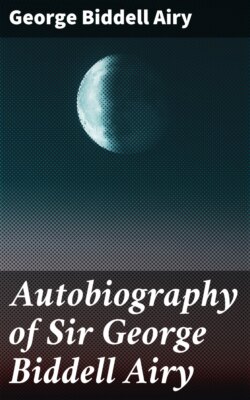Читать книгу Autobiography of Sir George Biddell Airy - George Biddell Airy - Страница 22
На сайте Литреса книга снята с продажи.
THE SENATE-HOUSE EXAMINATION.
ОглавлениеThe Questionists, as the undergraduates preparing for B.A. were called in the October term, were considered as a separate body; collected at a separate table in Hall, attending no lectures, but invited to attend a system of trial examinations conducted by one of the Tutors or Assistant-Tutors.
From the Acts, from the annual College examinations, and (I suppose) from enquiries in the separate Colleges, the Moderators acquired a general idea of the relative merits of the candidates for honours. Guided by this, the candidates were divided into six classes. The Moderators and Assistant Examiners were provided each with a set of questions in manuscript (no printed papers were used for Honours in the Senate House; in regard to the [Greek: hoi polloi] I cannot say). On the Monday on which the examination began, the Father of the College received all the Questionists (I believe), at any rate all the candidates for honours, at breakfast in the Combination Room at 8 o'clock, and marched them to the Senate House. My place with other honour-men was in the East Gallery. There one Examiner took charge of the 1st and 2nd classes united, another Examiner took the 3rd and 4th classes united, and a third took the 5th and 6th united. On Tuesday, one Examiner took the 1st class alone, a second took the 2nd and 3rd classes united, a third took the 4th and 5th classes united, and a fourth took the 6th class alone. On Wednesday, Thursday, and Friday the changes were similar. And, in all, the questioning was thus conducted. The Examiner read from his manuscript the first question. Those who could answer it proceeded to write out their answers, and as soon as one had finished he gave the word "Done"; then the Examiner read out his second question, repeating it when necessary for the understanding by those who took it up more lately. And so on. I think that the same process was repeated in the afternoon; but I do not remember precisely. In this manner the Examination was conducted through five days (Monday to Friday) with no interruption except on Friday afternoon. It was principally, perhaps entirely, bookwork.
But on two evenings there were printed papers of problems: and the examination in these was conducted just as in the printed papers of the present day: but in the private College Rooms of the Moderators. And there, wine and other refreshments were offered to the Examinees. How this singular custom began, I know not.
The order of merit was worked out on Friday afternoon and evening, and was in some measure known through the University late in the evening. I remember Mr. Peacock coming to a party of Examinees and giving information on several places. I do not remember his mentioning mine (though undoubtedly he did) but I distinctly remember his giving the Wooden Spoon. On the Saturday morning at 8 o'clock the manuscript list was nailed to the door of the Senate-House. The form of further proceedings in the presentation for degree (ad respondendum quaestioni) I imagine has not been much altered. The kneeling before the Vice-Chancellor and placing hands in the Vice-Chancellor's hands were those of the old form of doing homage.
The form of examination which I have described was complicated and perhaps troublesome, but I believe that it was very efficient, possibly more so than the modern form (established I suppose at the same time as the abolition of the Acts). The proportion of questions now answered to the whole number set is ridiculously small, and no accurate idea of relative merit can be formed from them.
